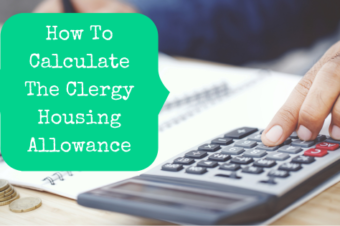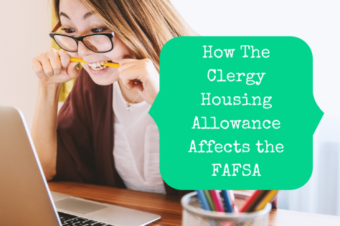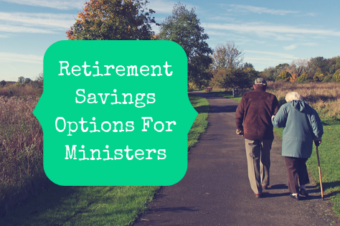
Here at Pastor’s Wallet, we talk a lot about the clergy housing allowance because it’s such a unique benefit for pastors. In fact, I even wrote a book on the topic, as you can see from the above graphic. Today, we are going to talk about how the housing allowance affects Social Security benefits.
You see, your housing allowance is considered compensation for your ministerial services. However, there are a lot of different programs that use compensation numbers and only about half of them count the housing allowance in their calculations. What about Social Security?
Does The Housing Allowance Count As Compensation For Social Security Purposes?
The housing allowance affects different aspects of Social Security retirement benefits in different ways. Let’s take a look at our two main concerns regarding compensation and Social Security; benefit accumulation and taxability of benefits.
Benefit Accumulation
As you’ve read in other posts on this blog, Social Security benefits are awarded based on a worker’s earnings history. They look at your top 35 years’ worth of earnings and add in zeroes if you have less than 35 years of work history. Those earnings that they use to calculate benefits DO include your housing allowance.
Both the cash housing allowance and the parsonage allowance count as income when calculating Social Security retirement benefits. Even if you only get paid $20,000 per year, if you also live for free in a parsonage that is worth $20,000 a year, your Social Security earnings report will show that you had $40,000 of income.
How does the Social Security Administration know how much your parsonage is worth? You tell them on Schedule SE. All pastors are required to pay Social Security and Medicare taxes as if they were self-employed. That means, instead of having an employer withhold and pay those taxes through the FICA system, you have to calculate them on Schedule SE along with your regular tax return and pay them that way. Thus, your housing allowance is included and affects your Social Security retirement benefits. To see what the Social Security Administration has on file as your personal earnings history, set up an account with them at ssa.gov.
Taxability of Benefits
While you’re working and earning money, your income affects the size of the Social Security retirement benefit you will be eligible for in the future. Then, once you start collecting your benefit, your income affects whether or not that benefit is taxed.
Yes, you may have to pay taxes on your Social Security retirement benefits. The percentage of your benefits that are taxed depends on your income and there are three different tiers. For 2021, a single person’s Social Security benefits are not taxed if their provisional income is under $25,000 (it is $32,000 for a married couple). For single tax filers earning between $25,000 and $34,000 or married couples earning between $32,000 and $44,000, up to 50% of benefits may be taxable. Above those limits, up to 85% of your Social Security benefits can be subject to income taxes.
This will affect you if you or your spouse start to collect Social Security benefits while you are still working. The big question for pastors is, does your housing allowance count as income? Will your housing allowance make more of your Social Security benefits taxable?
It’s your lucky day, the answer is no. The income used to calculate the taxability of Social Security benefits is called “provisional income.” When calculating provisional income, you pull your income numbers from the front of Form 1040 and Schedule 1 and the housing allowance does not appear on either of those. All that to say, your cash housing allowance or parsonage allowance should not increase the taxability of your benefits.
Work With A Professional
If you’re trying to figure out your taxes and Social Security benefits, I recommend working with a professional who understands the ins and outs of clergy tax issues. Most tax professionals do not understand these issues, so make sure to find one who does.
How can you determine if a tax professional understands clergy taxes? Ask these two questions:
- Are pastors employees or self-employed for Social Security tax purposes?
- Is a pastor’s church salary subject to income tax withholding?
If they don’t answer these two questions correctly, look elsewhere. Chances are, you will know more than they do (because you read this blog, of course!). In case you’re wondering, here are the answers to the questions:
- Pastors are always self-employed for Social Security tax purposes. Learn more.
- Pastors are not subject to income tax withholding. Learn more.
For a list of reader-recommended (I have not worked with them personally) tax preparers, check out the end of this article. I myself do not prepare tax returns.














